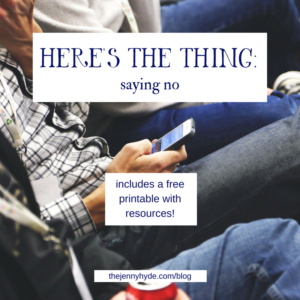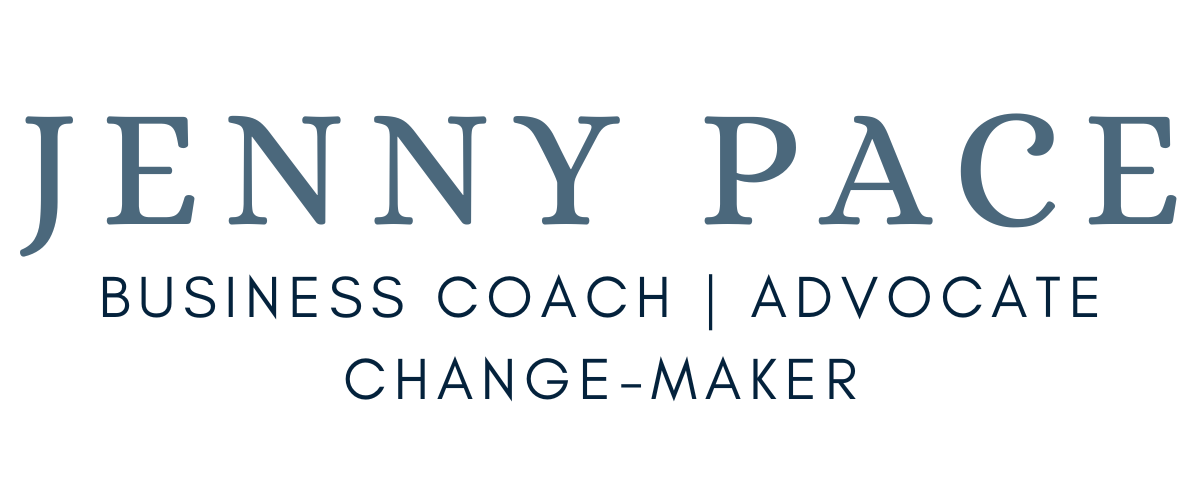 Pre-S: Looking for the printable? Skip to the end. But come back to read more good stuff!
Pre-S: Looking for the printable? Skip to the end. But come back to read more good stuff!
You know what I think? I think we’re all busy. I think we’re all trying to do lots of cool things. And I think there’s always opportunity to do more. There’s always another article to read, another email to answer, and another product to design (or blog post to write!).
And I believe this: We have to stop the glorification of busy.
We have to put things down. We have to change our minds and actively demonstrate to ourselves and others that “busy” doesn’t mean “successful”.
For our sanity, for our health, for our sustainability, we have to get comfortable with saying “no”.
Here’s what happens when I say yes when I really needed to say no:
I tell myself it’s not a big deal – I can just do the work or the favour and then it’ll be done. I’ll feel better about it and I’ll be helping someone.
I try to squeeze it in (whatever “it” is) but usually end up procrastinating or rolling it over to tomorrow or next week or similar.
I rush it, so I don’t do a good job.
I start to doubt my abilities. I worry about it when I’m in the shower or boiling the kettle (unlike when I’m doing work I’m fully invested in, which I can usually leave at my desk).
The client or friend or family member chases me. I feel bad and defensive and frustrated.
Resentment starts to build up and I get into black and white thinking (“I’m never going to do anything for them ever again. Look how ungrateful they are”) even if they’re just asking me to do what I said I’d do.
This is an extreme example of what happens, but it’s true. Do I end up feeling good? Occasionally. Do I add more stress to my life? Definitely. Does it benefit the other person? Possibly. But do they also get annoyed with me and wish they’d asked someone else? I imagine so.
Saying yes to stuff I can’t do or am not really invested in doesn’t serve me or anyone else.
But.
We’re nice and generous and we want to help. We don’t like letting people down. And of course there’s the “well, I have to say yes because I need the money / they’re family / I owe them” guilt and fear.
So how do we balance what’s best for us with others’ requests?
This is still a practice for me, but here are the things I’ve been working on:
- Get clear on your own priorities. I did this towards the end of last year, when there was just too much and I was pulled in a thousand directions. My priorities are: existing client work, marketing and developing Copper Boom, my family, my home, and my health. There are specifics within that, but it makes it very easy to see what I want to have time, energy and money for.
- Be clear that you’re going to start saying no to anything that doesn’t make the list. Once you have your list, you have a reference point. Something that you created in a calm moment, not the heat of the moment when you receive the email or the phone call and can get sideswiped by old habits.
- Share your “yes” list. This can be helpful with family, friends and staff members. If you’re going through a big change or finding that you’re overwhelmed, it can be really helpful to let loved ones and the people involved know upfront, before you start saying no to things you usually say yes to. (I’ve included some wording you can use below.)
- Start practicing AND understand that no is a complete sentence. We often think we have to justify saying no, but we don’t. We might put a “thank you” on the end, but we don’t have to apologise for not meeting someone’s expectations or give an excuse. Start practicing saying no in a way that feels comfortable to you, even to small things. (Again, more wording for you to practice with below).
- Let go of guilt. This one is an ongoing practice. Because we’ve been brought up and conditioned and generally expected to say yes to everything. Because fear and guilt sound the same, and are both trying to keep you safe in a very old-school sort of way. (“If you piss this person off, everyone in the whole world will be pissed off and you’ll never have a business or belong anywhere ever again.” They’re pretty extreme.) You might find physically shaking off guilt is helpful, when you’re feeling it. You might find it helpful to read some of the statements below. You might need to breathe through it and look back at your “yes” list to remind yourself that you’re really saying yes to those things.
It’s easy to write a list, and harder in practice. I know. But I hope that giving you some clear pointers helps to create clarity of thought.
I always find it helpful to think about the actual wording I’m going to say to people. It helps me to feel confident in dealing with requests off the cuff (like on a phone call or face to face), and like the “yes” list, I create them outside the heat of the moment, so I know I can trust them.
Here are some wording suggestions:
- Thank you for thinking of me! This isn’t something I can commit to right now.
- I need to consider my current schedule. Can I get back to you in a day / week?
- I’m currently prioritising my business / family / health and can’t take on extra commitments for the foreseeable future.
- No.
- Thanks for your email. This isn’t a good fit for me. I hope you find someone else who can do the project justice. Good luck with it!
- I’m not a specialist in ______ so this project isn’t something I can take on.
- This isn’t an option for me.
- I’d love to, but my priorities lie elsewhere right now.
- I have to say no. Thank you for the opportunity.
- Thanks for the suggestion. I’m not in a position to take it up.
- That isn’t an option for us. (This one’s particularly good for staff, when you don’t want to say why.)
- Thanks for the suggestion! I need to consider it in context of our other designs and what we’re trying to create. (For feedback on creative suggestions.)
- That doesn’t fit with what I’m imagining. What I’d LOVE is _____.
Notice that these responses are short and sweet! It will feel awkward saying them (or writing them) at first, especially if you’re used to saying yes and/or explaining yourself. Know that they’re enough: short, sweet and respectful. No apologies for committing to yourself, and no excuses.
I also recommend that you don’t say “maybe later” if you don’t mean it. If you’re never going to say yes to something in a billion years, don’t give someone false hope.
Need a reminder somewhere you can see it? Download the free printable here!
I’m sending so much courage and love as you go forth and say no so that you can say more YES!
Until soon,
Jenny x
Further resources:
- Check out Randi Buckley’s work on boundaries. She runs an amazing course that I thoroughly recommend.
- Get really clear on what you’re saying yes to with a one-to-one mentoring session or in my Achievable Dreams workshop (the next date is 23 March).


